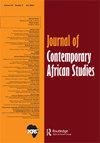对中产阶级城市居民、社会运动和政治动态的探索:来自纳米比亚首都温得和克的印象
IF 0.8
Q2 AREA STUDIES
引用次数: 0
摘要
2019年11月的纳米比亚国民议会和总统选举首次记录了前解放运动SWAPO的霸权地位下降。自那时以来,这种情况在2020年11月的区域和地方当局选举中出人意料地失去了支持。大多数市镇现在都在新的政治联盟的控制之下。这些机构包括具有社会运动要素的机构。在这种背景下,城市中产阶级值得特别关注:它是否影响了投票模式?城市中产阶级是否有足够的政治影响力,在政治治理的变革中发挥重要作用?探讨了温得和克戏剧性的政治转变:关注城市中产阶级的政治行为是否以及在多大程度上有助于分析当前正在展开的政治动态?本文章由计算机程序翻译,如有差异,请以英文原文为准。
Explorations into middle class urbanites, social movements and political dynamics: impressions from Namibia’s capital, Windhoek
ABSTRACT Namibia’s National Assembly and Presidential Elections in November 2019 documented for the first time a decline in the hegemonic status of the former liberation movement, SWAPO. This culminated since then in an unforeseen loss of support in the Regional and Local Authorities Elections of November 2020. Most municipalities and towns are now under the control of new political alliances. These include agencies with social movement elements. The urban middle class deserves in this context some special attention: Has it influenced voting patterns? Can an urban middle class be of sufficient political influence to play a significant role in changes of political governance? The dramatic political shifts in Windhoek are explored: if and to what extent might a focus on urban middle-class political behaviours help to analyse current political dynamics unfolding?
求助全文
通过发布文献求助,成功后即可免费获取论文全文。
去求助
来源期刊

Journal of Contemporary African Studies
AREA STUDIES-
CiteScore
2.20
自引率
0.00%
发文量
18
期刊介绍:
Journal of Contemporary African Studies (JCAS) is an interdisciplinary journal seeking to promote an African-centred scholarly understanding of societies on the continent and their location within the global political economy. Its scope extends across a wide range of social science and humanities disciplines with topics covered including, but not limited to, culture, development, education, environmental questions, gender, government, labour, land, leadership, political economy politics, social movements, sociology of knowledge and welfare. JCAS welcomes contributions reviewing general trends in the academic literature with a specific focus on debates and developments in Africa as part of a broader aim of contributing towards the development of viable communities of African scholarship. The journal publishes original research articles, book reviews, notes from the field, debates, research reports and occasional review essays. It also publishes special issues and welcomes proposals for new topics. JCAS is published four times a year, in January, April, July and October.
 求助内容:
求助内容: 应助结果提醒方式:
应助结果提醒方式:


